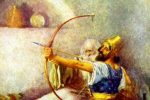SPIRITUAL INEPTITUDE OF KING JOASH (part 1)

“And Elisha said unto him, Take bow and arrows. And he took unto him bow and arrows. 16 And he said to the king of Israel, Put thine hand upon the bow. And he put his hand [upon it]: and Elisha put his hands upon the king’s hands. 17 And he said, Open the window eastward. And he opened [it]. Then Elisha said, Shoot. And he shot. And he said, The arrow of the LORD’S deliverance, and the arrow of deliverance from Syria: for thou shalt smite the Syrians in Aphek, till thou have consumed [them]. 18 And he said, Take the arrows. And he took [them]. And he said unto the king of Israel, Smite upon the ground. And he smote thrice, and stayed. 19 And the man of God was wroth with him, and said, Thou shouldest have smitten five or six times; then hadst thou smitten Syria till thou hadst consumed [it]: whereas now thou shalt smite Syria [but] thrice” (2Kings 13:15-19).
A cursory look at the above scenario will, from a logical point of view, absolve the king of the northern kingdom of Israel, Joash, of Prophet Elisha’s wrothy rebuke. Did the prophet give an instruction to the king on the number of times to hit the ground with the arrows? Was the king told to use all his arrows? So why the ireful disposition of the man of the God of Israel? Was there any possibility that the king should have any information on the number of times he should have shot the arrows? What could have pushed him to choose the wrong act? A meticulous Bible study of this incident will prove very rewarding, so, let us do just that.
King Joash had gone to visit the great prophet of Israel as he was dying. The king could not bear the huge loss. Strong’s Bible Dictionary definition of Joash is ‘Jehovah-fired’, while Easton gives it as ‘whom Jehovah bestowed’. Joash, no doubt, had himself backed by God, going by the definition of his name. Elisha means ‘God of supplication (or of riches)’. Joash, as an Israelite and who also grew up in the palace should not be a one to be found faith deficient, especially for the fact of being a one whom the LORD had ‘fired’ and ‘bestowed’ His beneficence. Joash had no business, whatsoever, to have misfired for he had to himself, an Elisha, to remind him of how richly blessed by this great Jehovah he was.
 SHOOT!!!
SHOOT!!!
To prove how fortunately blessed he was, the man of God placed his anointed hand upon his hand before he commenced his shooting. Arrows are only for strong armed and willed men (Psalm 127:4). It is the tradition in the East to shoot arrows in an enemy’s territory to herald hostility. When he told him to “Put thine hand”, Elisha told the king to ‘let fly’ the arrows from a hand of power. The word ‘hand’, in Hebrew is yad (yawd): ‘a hand (the open one (indicating power, means, direction, etc)’. Joash’s hand had been endowed with power of success for Elisha’s lent hand represented Jehovah’s. Jehoash, therefore, had no excuse to fail.
The word ‘open’, pathach (paw-thakh’) means: ‘1. to open wide (literally or figuratively) 2. specifically, to loosen, begin, plough, carve’. ‘Eastward’ is qedem (keh’-dem) (or qedmah {kayd’-maw}): 1. the front, of place (absolutely, the fore part, relatively the East) or time (antiquity) 2. often used adverbially (before, anciently, eastward)’. Qedem comes from the root word qadam (kaw-dam’) – to project (one self), i.e. precede; – hence, to anticipate, hasten, meet (usually for help)’. Joash was enabled with a considerable latitude when he heard the word ‘pathach’. He should anticipate an incessant incursion of his kingdom by the devil who is nothing less than a stubborn goat. ‘Window’ is supposed to usher in the light of understanding, dear King Joash, and does ‘east’ not remind you of the coming of light and of course where the Syrian enemies had always emerged?

Aphek or ‘Apheq (af-ake’) (or Aphiyq {af-eek’}) means ‘fortress, stronghold; it was the scene of the licentious worship of the Syrian Aphrodite’. A fortress is something an enemy would never want to lose. Joash showed himself to be a weakling in this wise. The spiritual incompetence of Joash was unveiled when the words of the prophet put him to test. He was not fit to unclasp the vicelike grasp that his Syrian foe had in his domination of his environs. He shot thrice: three being the scriptural number for the perfect manifestation of the Trinity. Joash knew of the Jehovah of Israel but the power thereof he unfortunately denied (2Timothy 3:5). He lacked what it took to walk according to the revealed word of God. The king shot at least twice less than expected. Two is the number of witness and of testimony. Joash, by his action, failed in the test to be a witness of the God of Israel and to testify of HIS beneficence.
If he had shot five times he would have invoked the enabling strength found in the grace of Jehovah. And if he had done it six times he would have claimed the Divine ordained dominion of man (Genesis 1:26; Psalm 115:16): for having been created on day number six. King Joash depended on the understanding of the fallen nature of his being which is the bane of man’s precipitous spiritual imbalance. He did not know that by his choice he spurned the spirit of five: the unmerited favour of God. Neither did the king perceive that his refusal of six is the rejection of Christ (1Corrinthians 15:47, “The first man is of the earth, earthy: the second man is the Lord from heaven”). It is strictly a spiritual matter. (…to be concluded…)
Read the concluding part 2 here
Visits: 88





